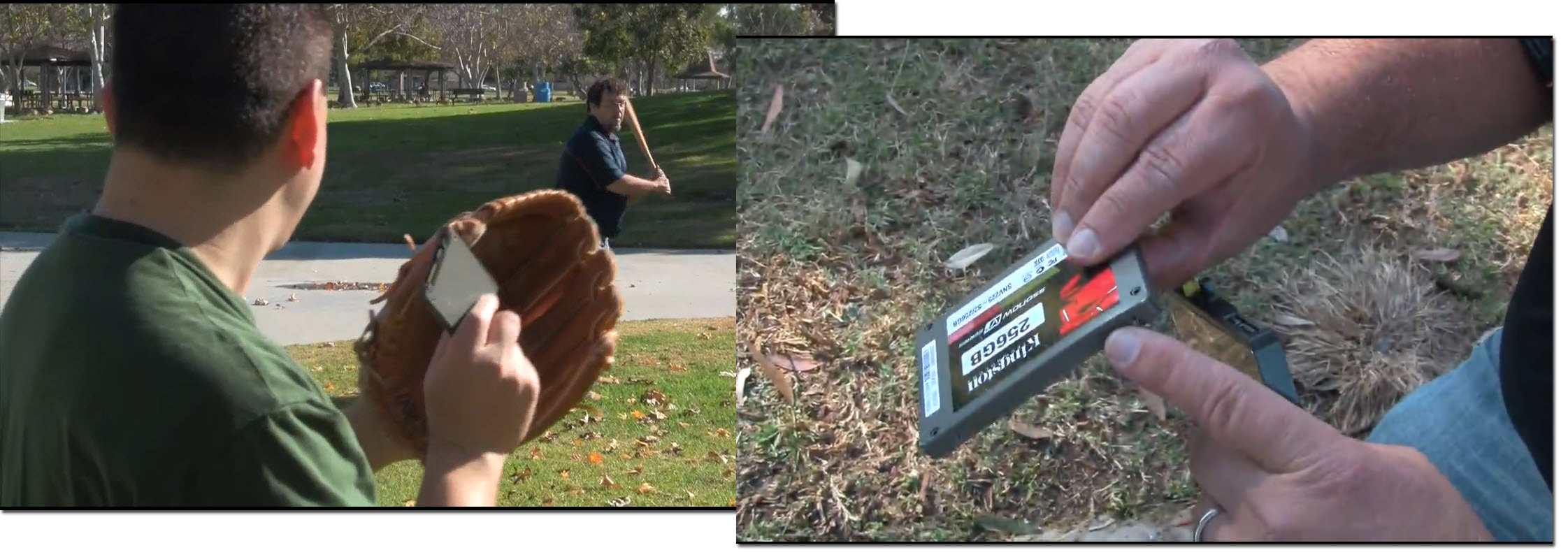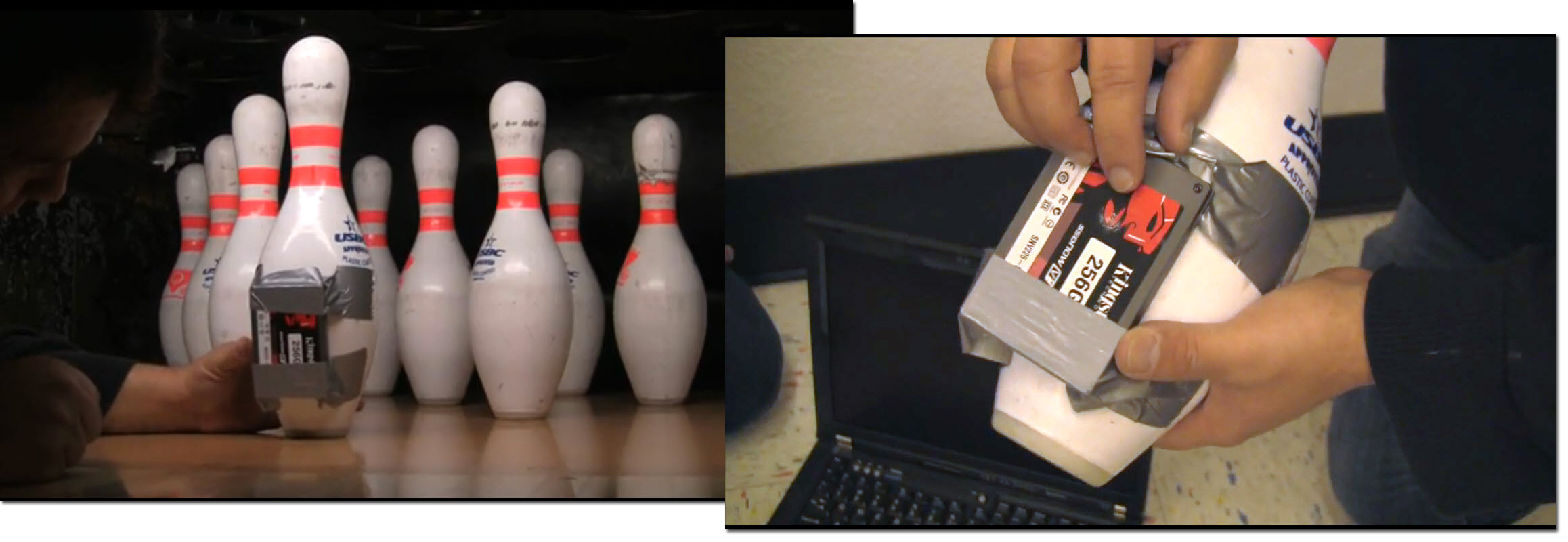Q&A: Tom's Hardware And Kingston On SSD Technology
Power And Destruction!
TC: We should mention power consumption versus HDD.
LK: That's true. SSD power consumption is great in a client workload, but we can all agree that the big battery suck on a notebook is not the drive. It's the screen, CPU, and GPU. So an SSD might get you a little more battery life—I think I once measured about 20 more minutes on a 3-hour Dell—but it's really a server thing. There, it's like night and day. If you compare a typical 15K SAS drive to one of our SSDs, at active load you're looking at not even a watt. That SAS drive will pull 10 watts. It's about watts per IOPS. How much work can we get done with one SSD versus you having to stripe 50 or 60 15K SAS drives. So the power consumption to do actual work just mushrooms beyond belief. SSDs run cooler, so you don't have to spend as much on temperature controls, and they just consume a lot less power. On the server side, it's a very big deal. We have a lot of customers that are power-constrained. They just can't pull any more out of the wall or off the grid. So this is a way for us to help with that problem. They can stay within their power budget and still get all the work they need done.
TH: Last thing: I’ve always wondered about these G-shock ratings on SSDs. 1500 Gs? Seriously? That’s like a 27-floor drop. I have a feeling that if I drop a drive from the 26th floor, it’s not going to matter if the NAND chips survive because the casing will be in about 400 pieces. And how do you simulate that—with a baseball bat? Do you run over it with your SUV?
LK: [laughing] Have you seen our video?
TH: Video?
LK: That's why we were laughing. We actually did hit it with a baseball bat. It was pitched to me, and I hit it, and the drive still worked. We ran over it with a car and it still worked. We actually took a blowtorch to it and it still worked.
TH: Shut up!
Get Tom's Hardware's best news and in-depth reviews, straight to your inbox.
LK: That’s why I can't believe you said that. Yeah, we even hit it with a golf club. That didn’t work. We hit it hard enough that the NAND actually decoupled from the PCB. It was flying around all over the place. We made SSD bits with that one. Anyway, we subjected them to some pretty good stuff.
TH: So an SSD will withstand a base hit but not solid nine iron.
LK: When I hit it with a driver, I basically tore off the casing. It split in two, literarily sheered in the middle. So how much force is that? I assume the golf club made contact at approximately 100 miles an hour, and we could probably measure how heavy the driver was. Dropping it off a building? Well, we're probably up a good three stories here, so tossing it off of that just didn’t seem that dramatic. We’ve done it, sure. Multiple drops, actually. But why do the obvious when SSD can do so much more?
-
nonxcarbonx Kingston's mitigation software is the best I've seen. On another note, is there a link to the destruction video?Reply -
pink315 "Now, with a hard drive, the arm has to move. Now, with a hard drive, the arm has to move."Reply
I'm not sure if you were trying to be dramatic, or if you just accidentally wrote the same thought twice. Just pointing it out. -
ta152h One way to preserve some of the life of any hard drive is to shut off virtual memory. Most computers don't need it, and if you do, than you're probably better off getting more memory anyway.Reply
The ideal thing for booting up fast would be to go back to using core memory :-P. RAM that doesn't lose power when you turn it off is pretty cool. Low power, low heat, and would impress people when you say "Oh, that? It's my core memory array.". You'd get dates for sure. Can't say what they'd look like, or if they'd be sane. Or even female :( .
Still, I'd buy it. Cache handles most reads anyway, and I'm too old fashioned to feel something is a computer without some form of magnetic storage in it. -
outlw6669 Fun read but nothing really new...Reply
I like how good they are at dodging the tough questions.
What value is there in Kingstons Intel based SSD's vs Intel original?
Well, they helped Kingston launch a very strong product :P
-
neiroatopelcc Maybe it's just me, but I don't feel they properly answered the question of why there's a wear difference bewtween sequential and random ...Reply -
mitch074 I solved my netbook's boot times...Reply
It runs Linux, with a compressed kernel image.
Looks like real mode disk access, registry hives, antivirus and such do slow Windows boot times. -
vvhocare5 I guess Im not a fan of these types of interviews. The interviewee is really just trying to get advertising for their product and they only say good things and gloss over the negatives. They also have some good one liners they toss out, but thats about it.Reply
I would prefer to see the product benchmarked and compared on price..and then let us decide how we are going to spend our money. -
anamaniac Interesting interview.Reply
Keep them coming. =)
Now I have the urge to go buy a 256GB SLC drive and play flaming baseball with it... I probably shouldn't... -
El_Capitan I like how they say, "The worst kind of writes that you can apply to an SSD are random. You will wear a drive out quicker that way". However, Kingston and Intel put all their advertising efforts into promoting the speed of their IOPS for their SSD's for server environments. That means they want you to buy their product to use it so it wears out quicker... which means you need to buy another one to replace it. Now that's a wicket smart business strategy.Reply


